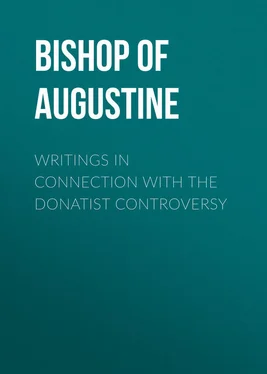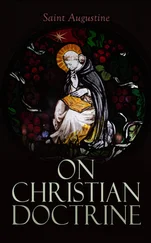Saint Augustine - Writings in Connection with the Donatist Controversy
Здесь есть возможность читать онлайн «Saint Augustine - Writings in Connection with the Donatist Controversy» — ознакомительный отрывок электронной книги совершенно бесплатно, а после прочтения отрывка купить полную версию. В некоторых случаях можно слушать аудио, скачать через торрент в формате fb2 и присутствует краткое содержание. Жанр: foreign_antique, foreign_prose, на английском языке. Описание произведения, (предисловие) а так же отзывы посетителей доступны на портале библиотеки ЛибКат.
- Название:Writings in Connection with the Donatist Controversy
- Автор:
- Жанр:
- Год:неизвестен
- ISBN:нет данных
- Рейтинг книги:3 / 5. Голосов: 1
-
Избранное:Добавить в избранное
- Отзывы:
-
Ваша оценка:
- 60
- 1
- 2
- 3
- 4
- 5
Writings in Connection with the Donatist Controversy: краткое содержание, описание и аннотация
Предлагаем к чтению аннотацию, описание, краткое содержание или предисловие (зависит от того, что написал сам автор книги «Writings in Connection with the Donatist Controversy»). Если вы не нашли необходимую информацию о книге — напишите в комментариях, мы постараемся отыскать её.
Writings in Connection with the Donatist Controversy — читать онлайн ознакомительный отрывок
Ниже представлен текст книги, разбитый по страницам. Система сохранения места последней прочитанной страницы, позволяет с удобством читать онлайн бесплатно книгу «Writings in Connection with the Donatist Controversy», без необходимости каждый раз заново искать на чём Вы остановились. Поставьте закладку, и сможете в любой момент перейти на страницу, на которой закончили чтение.
Интервал:
Закладка:
11. Answer me this, ye ravening wolves, who, seeking to be clad in sheep's clothing, 90 90 Matt. vii. 15.
think that the letters of the blessed Cyprian are in your favour. Did the sacrilege of schismatics defile Cyprian, or did it not? If it did, the Church perished from that instant, and there remained no source from which ye might spring. If it did not, then by what offence on the part of others can the guiltless possibly be denied, if the sacrilege of schism cannot defile them? Wherefore, then, have ye severed yourselves? Wherefore, while shunning the lighter offences, which are inventions of your own, have ye committed the heaviest offence of all, the sacrilege of schism? Will ye now perchance confess that those men were no longer schismatics or heretics who had been baptized without the communion of the Church, or in some heresy or schism, because by coming over to the Church, and renouncing their former errors, they had ceased to be what formerly they were? How then was it, that though they were not baptized, their sins remained not on their heads? Was it that the baptism was Christ's, but that it could not profit them without the communion of the Church; yet when they came over, and, renouncing their past error, were received into the communion of the Church by the laying on of hands, then, being now rooted and founded in charity, without which all other things are profitless, they began to receive profit for the remission of sins and the sanctification of their lives from that sacrament, which, while without the pale of the Church, they possessed in vain?
12. Cease, then, to bring forward against us the authority of Cyprian in favour of repeating baptism, but cling with us to the example of Cyprian for the preservation of unity. For this question of baptism had not been as yet completely worked out, but yet the Church observed the most wholesome custom of correcting what was wrong, not repeating what was already given, even in the case of schismatics and heretics: she healed the wounded part, but did not meddle with what was whole. And this custom, coming, I suppose, from apostolical tradition (like many other things which are held to have been handed down under their actual sanction, because they are preserved throughout the whole Church, though they are not found either in their letters, or in the Councils of their successors), – this most wholesome custom, I say, according to the holy Cyprian, began to be what is called amended by his predecessor Agrippinus. But, according to the teaching which springs from a more careful investigation into the truth, which, after great doubt and fluctuation, was brought at last to the decision of a general Council, we ought to believe that it rather began to be corrupted than to receive correction at the hands of Agrippinus. Accordingly, when so great a question forced itself upon him, and it was difficult to decide the point, whether remission of sins and man's spiritual regeneration could take place among heretics or schismatics, and the authority of Agrippinus was there to guide him, with that of some few men who shared in his misapprehension of this question, having preferred attempting something new to maintaining a custom which they did not understand how to defend; under these circumstances, considerations of probability forced themselves into the eyes of his soul, and barred the way to the thorough investigation of the truth.
Chap. viii. – 13. Nor do I think that the blessed Cyprian had any other motive in the free expression and earlier utterance of what he thought in opposition to the custom of the Church, save that he should thankfully receive any one that could be found with a fuller revelation of the truth, and that he should show forth a pattern for imitation, not only of diligence in teaching, but also of modesty in learning; but that, if no one should be found to bring forward any argument by which those considerations of probability should be refuted, then he should abide by his opinion, with the full consciousness that he had neither concealed what he conceived to be the truth, nor violated the unity which he loved. For so he understood the words of the apostle: "Let the prophets speak two or three, and let the other judge. If anything be revealed to another that sitteth by, let the first hold his peace." 91 91 1 Cor. xiv. 29, 30.
"In which passage he has taught and shown, that many things are revealed to individuals for the better, and that we ought not each to strive pertinaciously for what he has once imbibed and held, but if anything has appeared better and more useful, he should willingly embrace it." 92 92 Cypr. Ep. lxxi.
At any rate, in these words he not only advised those to agree with him who saw no better course, but also exhorted any who could to bring forward arguments by which the maintenance of the former custom might rather be established; that if they should be of such a nature as not to admit of refutation, he might show in his own person with what sincerity he said "that we ought not each to strive pertinaciously for what he has once imbibed and held, but that, if anything has appeared better and more useful, he should willingly embrace it." [92] Cypr. Ep. lxxi.
But inasmuch as none appeared, except such as simply urged the custom against him, and the arguments which they produced in its favour were not of a kind to bring conviction to a soul like his, this mighty reasoner was not content to give up his opinions, which, though they were not true, as he was himself unable to see, were at any rate not confuted, in favour of a custom which had truth on its side, but had not yet been confirmed. And yet, had not his predecessor Agrippinus, and some of his fellow-bishops throughout Africa, first tempted him to desert this custom, even by the decision of a Council, he certainly would not have dared to argue against it. But, amid the perplexities of so obscure a question, and seeing everywhere around him a strong universal custom, he would rather have put restraint upon himself by prayer and stretching forth his mind towards God, so as to have perceived or taught that for truth which was afterwards decided by a general Council. But when he had found relief amid his weariness in the authority of the former Council 93 93 The former Council of Carthage was held by Agrippinus early in the third century, the ordinary date given being 215 A.D.
which was held by Agrippinus, he preferred maintaining what was in a manner the discovery of his predecessors, to expending further toil in investigation. For, at the end of his letter to Quintus, he thus shows how he has sought repose, if one may use the expression, for his weariness, in what might be termed the resting-place of authority. 94 94 Tanquam lectulo auctoritatis.
Chap. ix. – 14. "This moreover," says he, "Agrippinus, a man of excellent memory, with the rest, bishops with him, who at that time governed the Church of the Lord in the province of Africa and Numidia, did, when by common counsel duly weighed, establish and confirm; whose sentence, being both religious and legitimate and salutary in accordance with the Catholic faith and Church, we also have followed." 95 95 Cypr. Ep. lxxi.
By this witness he gives sufficient proof how much more ready he would have been to bear his testimony, had any Council been held to discuss this matter which either embraced the whole Church, or at least represented our brethren beyond the sea. But such a Council had not yet been held, because the whole world was bound together by the powerful bond of custom; and this was deemed sufficient to oppose to those who wished to introduce what was new, because they could not comprehend the truth. Afterwards, however, while the question became matter for discussion and investigation amongst many on either side, the new practice was not only invented, but even submitted to the authority and power of a general Council, – after the martyrdom of Cyprian, it is true, but before we were born. 96 96 The general Council, on whose authority Augustine relies in many places in this work, was either that of Arles, in 314 A.D., or of Nicæa, in 325 A.D., both of them being before his birth, in 354 A.D. He quotes the decision of the same council, contra Parmenianum , ii. 13, 30; de Hœresibus , 69; Ep. xliii. 7, 19. Migne brings forward the following passages in favour of its being the Council of Arles to which Augustine refers, since in them he ascribes the decision of the controversy to "the authority of the whole world." Contra Parmenianum , iii. 4, 21: "They condemned," he says, "some few in Africa, by whom they were in turn vanquished by the judgment of the whole world;" and he adds, that "the Catholics trusted ecclesiastical judges like these in preference to the defeated parties in the suit." Ib. 6, 30: He says that the Donatists, "having made a schism in the unity of the Church, were refuted, not by the authority of 310 African bishops, but by that of the whole world." And in the sixth chapter of the first book of the same treatise, he says that the Donatists, after the decision at Arles, came again to Constantine, and there were defeated "by a final decision," i. e. at Milan, as is seen from Ep. xliii. 7, 20, in the year 316 A.D.
But that this was indeed the custom of the Church, which afterwards was confirmed by a general Council, in which the truth was brought to light, and many difficulties cleared away, is plain enough from the words of the blessed Cyprian himself in that same letter to Jubaianus, which was quoted as being read in the Council. 97 97 See above, ch. ii. 3.
For he says, "But some one asks, What then will be done in the case of those who, coming out of heresy to the Church, have already been admitted without baptism?" where certainly he shows plainly enough what was usually done, though he would have wished it otherwise; and in the very fact of his quoting the Council of Agrippinus, he clearly proves that the custom of the Church was different. Nor indeed was it requisite that he should seek to establish the practice by this Council, if it was already sanctioned by custom; and in the Council itself some of the speakers expressly declare, in giving their opinion, that they went against the custom of the Church in deciding what they thought was right. Wherefore let the Donatists consider this one point, which surely none can fail to see, that if the authority of Cyprian is to be followed, it is to be followed rather in maintaining unity than in altering the custom of the Church; but if respect is paid to his Council, it must at any rate yield place to the later Council of the universal Church, of which he rejoiced to be a member, often warning his associates that they should all follow his example in upholding the coherence of the whole body. For both later Councils are preferred among later generations to those of earlier date; and the whole is always, with good reason, looked upon as superior to the parts.
Интервал:
Закладка:
Похожие книги на «Writings in Connection with the Donatist Controversy»
Представляем Вашему вниманию похожие книги на «Writings in Connection with the Donatist Controversy» списком для выбора. Мы отобрали схожую по названию и смыслу литературу в надежде предоставить читателям больше вариантов отыскать новые, интересные, ещё непрочитанные произведения.
Обсуждение, отзывы о книге «Writings in Connection with the Donatist Controversy» и просто собственные мнения читателей. Оставьте ваши комментарии, напишите, что Вы думаете о произведении, его смысле или главных героях. Укажите что конкретно понравилось, а что нет, и почему Вы так считаете.












